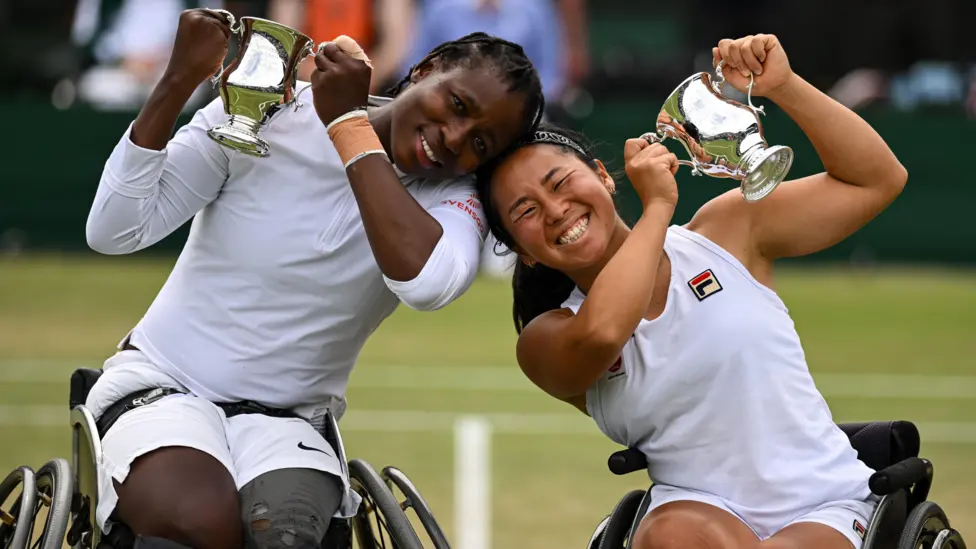Montjane grateful for support after mother’s death
4 min read
Montjane won her first Wimbledon title in July, partnering Yui Kamiji of Japan to success in the women's wheelchair doubles

Montjane won her first Wimbledon title in July, partnering Yui Kamiji of Japan to success in the women's wheelchair doubles
In the wake of winning her first Wimbledon title, South African wheelchair tennis player Kgothatso Montjane faced a profound personal loss that cast a shadow over her achievement. The 38-year-old’s joy at reaching a career milestone was overshadowed by the death of her mother, Margaret, from kidney complications at the end of July. The loss left Montjane with an “immense void” that deeply affected her mental health, and she described how difficult it was to reconcile her personal grief with her professional triumph.
“To lose a mother at that time of your life – after just winning Wimbledon and trying to celebrate – it all came crashing down,” Montjane told BBC’s Newsday. Her mother’s death not only left her emotionally drained but also forced her to reassess her priorities. As a result, Montjane made the difficult decision to pull out of the Paris 2024 Paralympic Games, choosing to focus on her mental and emotional well-being during an incredibly challenging time. “It was one of the most difficult decisions I’ve ever had to make,” she admitted.
Throughout this period of mourning, Montjane received overwhelming support from across the tennis world, including messages from legends like Billie Jean King, who expressed her condolences and encouragement. “If it wasn’t for the support I received, I just couldn’t imagine myself coming back,” Montjane reflected. “My management team and everyone around me have been there for me. I’m just happy to be playing tennis again.”
After taking time to heal, Montjane made her return to elite tennis at the Wheelchair Tennis Masters in the Netherlands, a prestigious tournament for the best-ranked players of the year. She marked her comeback with a hard-fought victory over Aniek van Koot in the singles competition, winning in three sets. Montjane also triumphed in doubles with her longtime partner, Yui Kamiji, securing another win to add to her list of accomplishments.
Although Montjane did not progress past the group stages in singles and was eliminated in the doubles semi-finals, the event was a reminder of her resilience. “This year hasn’t been easy for me, but because I love the game, I always try my best to stay at the top,” Montjane said. “The Masters are a benchmark for your year-end results, and it’s important for top players to push themselves and show greatness.”
Montjane’s journey in wheelchair tennis has been marked by remarkable consistency. Over the past decade, she has been regularly ranked among the top ten players in the world. Currently, she holds the seventh spot in singles and fourth in doubles, a testament to her dedication and skill. Her doubles success with Kamiji has been particularly notable, with the pair winning Grand Slam titles at the French Open and US Open last year. In 2024, they were runners-up at the Australian Open, still the only Grand Slam title that eludes Montjane.
“My passion for the game is the key to my success,” Montjane explained. “Tennis is not an easy sport, but you need to stay motivated and keep that edge to always want to improve. The love for the game keeps you consistent.”
Montjane’s impact extends far beyond her athletic achievements. Born with amniotic band syndrome, which resulted in the amputation of her left leg below the knee at the age of 12, Montjane began wheelchair tennis at 19 and has since become an icon in South Africa’s disability sport community. Her journey from overcoming personal challenges to becoming one of the world’s top wheelchair tennis players has inspired countless others, particularly in her home country.
In early November, Montjane was honored in Johannesburg, where she was named both “Sports Personality of the Year” and “Role Model of the Year” at the Feather Awards, Africa’s largest queer awards ceremony. These accolades reflect her influence both on and off the court, as she continues to break barriers and inspire a new generation of athletes.
As Montjane’s career nears its twilight, she hopes to leave behind a lasting legacy, particularly in South Africa, where tennis is not always accessible due to financial constraints. She made history as the first black South African woman to qualify for Wimbledon, and now she hopes her success will inspire others to take up the sport. “Someone needs to be doing it so others develop an interest in it,” she said. “I’m hoping that through my achievements, we’ll see other young people picking up a racket and following in my footsteps.”
Montjane remains hopeful that her journey will ignite a passion for tennis in Africa. “I don’t think I have a lot of years left in me, but I hope to spark that interest and inspire others to take up the sport and perhaps take over from me.”
As she continues to compete at the highest level, Montjane’s legacy is already secured—not only for her incredible achievements but also for the inspiration she has provided to athletes around the world.